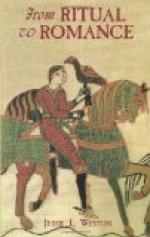“Car se tu demandé l’eusses
Li rice roi qui moult s’esmaie
Fust or tost garis de sa plaie
Et si tenist sa tière en pais
Dont il n’en tenra point jamais,”
but by Perceval’s failure to ask the question he has entailed dire misfortune upon the land:
“Dames en perdront lor maris,
Tiéres en seront essiliés,
Et pucielles desconselliés
Orfenes, veves, en remanront
Et maint chevalier en morront."[8]
This idea, that the misfortunes of the land are not antecedent to, but dependent upon, the hero’s abortive visit to the Grail Castle, is carried still further by the compiler of the Perlesvaus, where the failure of the predestined hero to ask concerning the office of the Grail is alone responsible for the illness of the King and the misfortunes of the country. “Une grans dolors est avenue an terre novelement par un jeune chevalier qui fu herbergiez an l’ostel au riche roi Peschéor, si aparut à lui li saintimes Graaus, et la lance de quoi li fiers seigne par la poignte; ne demanda de quoi ce servoit, ou dont ce venoit, et por ce qu’il ne demanda sont toutes les terres comméues an guerre, ne chevalier n’ancontre autre au forest qu’il ne li core sus, et ocie s’il peut."[9]
“Li Roi Pecheors de qui est grant dolors, quar il est cheüz en une douleureuse langour—ceste langour li est venue par celui qui se heberga an son ostel, à qui li seintimes Graaus s’aparut, por ce que cil ne vost demander de qu’il an servoit, toutes les terres an furent comméues en gerre."[10]
“Je suis cheüz an langour dès cele oure que li chevaliers se herberga çoianz dont vous avez oï parler; par un soule parole que il déloia a dire me vint ceste langour."[11]
From this cause the Fisher King dies before the hero has achieved the task, and can take his place. “Li bons Rois Peschiéres est morz."[12] There is here no cure of the King or restoration of the land, the specific task of the Grail hero is never accomplished, he comes into his kingdom as the result of a number of knightly adventures, neither more nor less significant than those found in non-Grail romances.




